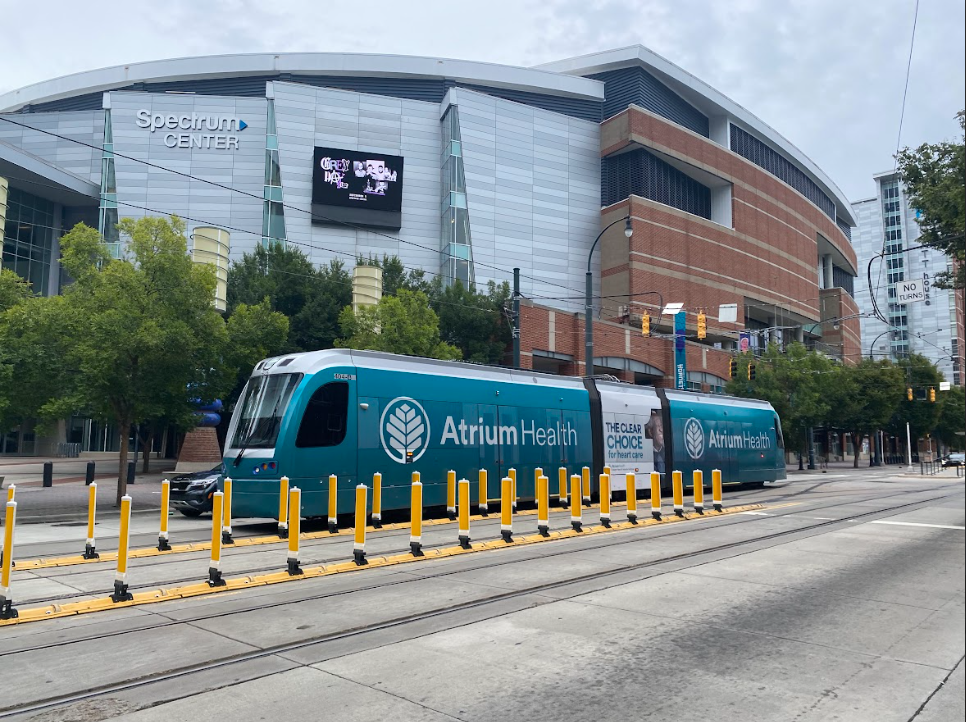Transportation, Planning and Development Committee: September 5, 2023

A streetcar passes in front of the Spectrum Center
On Tuesday, September 5, the Transportation, Planning & Development Committee met to receive three updates: one from interim CATS CEO Brent Cagle, another from Planning Director Alyson Craig, and the last from Charlotte Mecklenburg Schools Executive Director of Facilities and Real Estate Planning Dennis LaCaria. This blog will focus on the first two updates.
CATS update
Cagle kicked off his report with news of yet another light rail derailment in the railyard. This latest incident took place on August 29 and no injuries were reported. CATS is working with NCDOT and the Federal Transit Administration (FTA) to understand why these derailments are occurring and find solutions. Cagle explained that CATS is in the process of filling operator vacancies, which means that there is a large percentage of new operators who are still learning the ropes. These new recruits have passed through their initial training, but it will take time for them to gain experience. CATS is also looking for products that will provide more visual cues to help operators switch tracks successfully. Several minor derailments have occurred in the railyard over the past six months as a result of unsuccessful track switches.
In other rail news, Cagle reported that on August 19, CATS amended the LYNX Gold Line streetcar frequency from 20 minutes to 30 minutes. This is intended to be a short-term change to provide better reliability to passengers while CATS recruits and trains more operators. The 2020-minutechedule should return in the next four months.
To finish his report, Cagle assured committee members that the last six bridge inspections, which have been in process for several months, will be completed as soon as the flag crews can be scheduled with the railroad.
Committee Chair Ed Driggs commended Cagle on his work and asked City Manager Marcus Jones if staff is considering hiring a permanent CATS CEO now that the department is stabilizing. Jones said that Cagle will stay on a bit longer before the CEO search begins.
Planning update
Craig started her presentation with a quick reminder that so far three text amendments have been approved for the Unified Development Ordinance (UDO), which was adopted in June 2022. Six more amendments are being prepared: five technical and one policy-based. The technical amendments are simple language clarifications and minor corrections. The policy-based amendment would modify the existing uses for campus districts. More details on these text amendments are forthcoming.
The bulk of this update was on the community engagement strategies that Planning staff are implementing before proposing text amendments. For the technical amendments, staff is soliciting feedback from the community via the UDO website, social media, mailings, and public hearings. The policy-based amendments are more substantial and therefore require a more nuanced approach, as some amendments will impact certain neighborhoods more than others. For these amendments, Planning staff is working with the UDO Advisory Committee and engaging communities through workshops, surveys, neighborhood meetings, and pop-up meetings.
Committee Chair Driggs pointed out that the Policy Map, an accompaniment of the UDO, paints a broad zoning picture throughout the city, and some developers are using this to their advantage. Amending the UDO to fully align with the vision of the 2040 Comprehensive Plan will take several years, but rezoning petitions will continue and city council will have to make decisions in the meantime.
Driggs suggested that the city “tap the brakes” on development, especially in areas where congestion is problematic, while the UDO matures.
“Until we progress a little bit in terms of actually delivering those alternatives to cars, we can’t be too aggressive about denying cars their drive-thrus and their parking,” Driggs said.
Craig responded that under the new Comprehensive Transportation Review, a complement to the UDO, developers are required to invest a lot more in infrastructure, which takes the burden off of the city. We haven’t yet seen how this will play out, but it could play a significant role in adding much-needed transportation infrastructure.
Both Councilmembers James Mitchell and Chair Driggs emphasized their support for Planning staff and willingness to push for additional staff if that will ensure the long-term success of the planning process.
Our take
We agree with Craig that the UDO is a “major body of work” that will take time and thoughtful community engagement to work through. Text amendments are a necessary part of this process and will move us toward the vision laid out in the 2040 Comprehensive Plan. But that doesn’t mean we should stop advocating for a better mobility network and development rules that will support walkability in the meantime. As the name of the committee affirms, transportation and planning go hand-in-hand. We must invest in both at the same time or we run the risk of worse congestion, greater lack of access to opportunity, a decline in public health, and increased emissions.
Watch the meeting recording here and read the agenda here.
Thanks for reading!
As a nonprofit, community support is essential for us to keep doing what we do – including providing free articles like this. If you found this article helpful, please consider supporting Sustain Charlotte.
Want to stay in the loop? Subscribe to our weekly newsletter and follow us on Instagram, Facebook, and Twitter.
